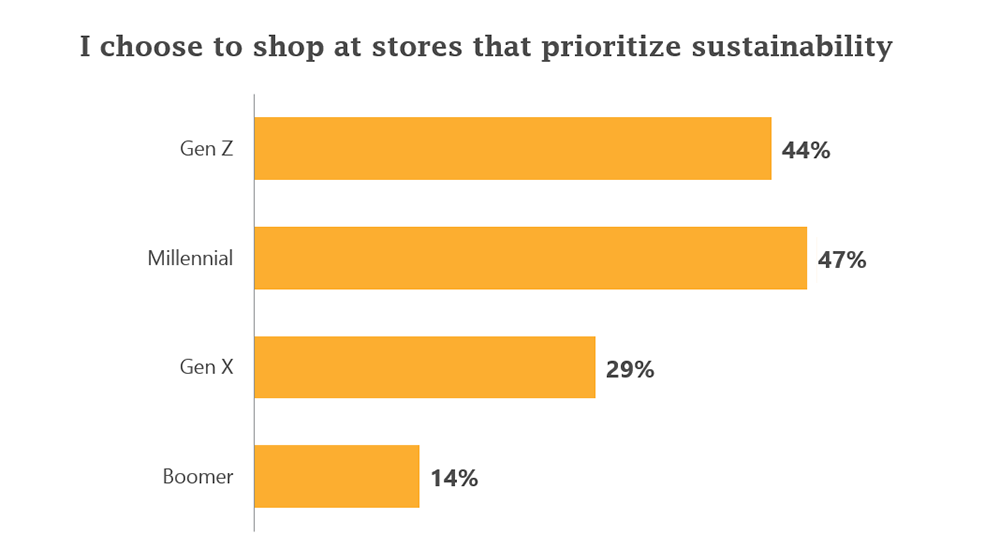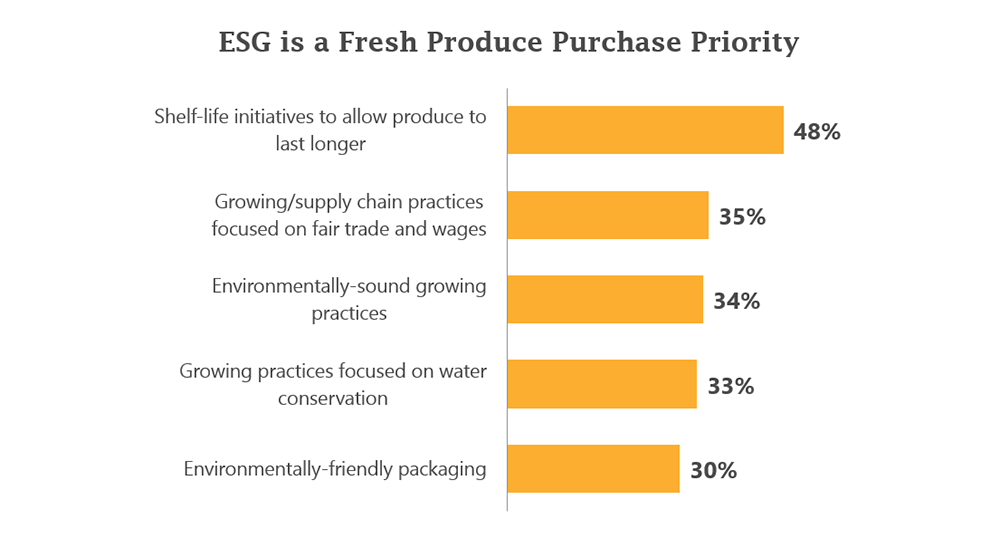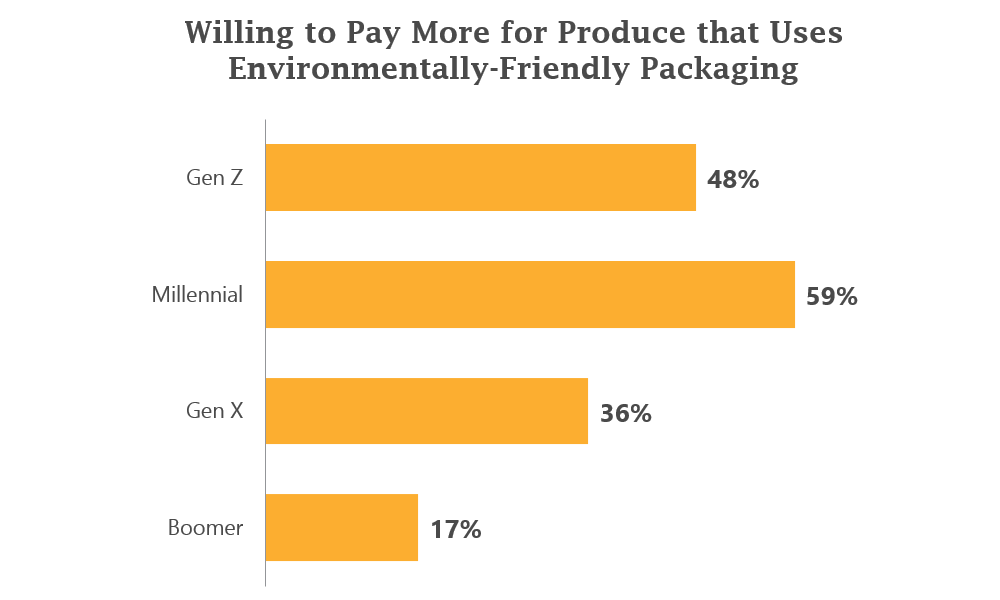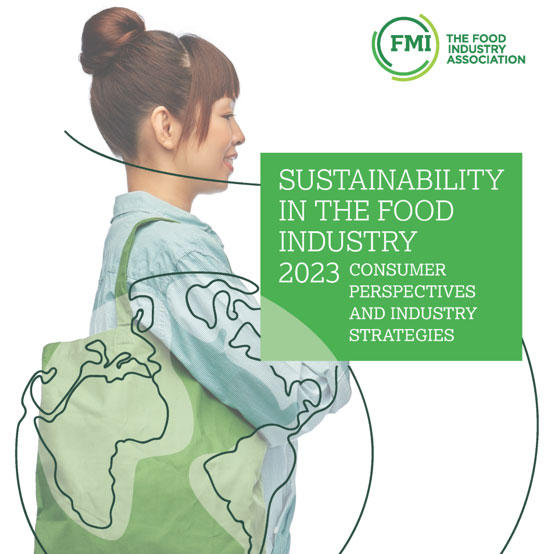This is the second installment in the FMI blog series on sustainability in the food industry. This series shares compelling research and covers aspects ranging from consumer perspectives to industry opportunities.
By: Steve Markenson, Vice President, Research & Insights, FMI

The playwright George Bernard Shaw once said that youth is wasted on the young.
While Shaw was a great thinker, I don't agree with his notion about youth. Young people are highly unique because of their youth. As a researcher, I find the link between "youth" and "young" fascinating and leads to insightful findings about younger consumers' perspectives on issues.
Consider the topic of environmental sustainability. It makes sense that younger consumers — who have the longest futures ahead of them — would be interested in this topic. Sure enough, that is exactly what we're finding in FMI's recent food industry data. This creates openings for the food industry to engage more deeply with these consumers.
Younger Shoppers Prioritize Sustainability
Any discussion of younger shoppers centers on Gen Z, the oldest of whom are in their mid-20s, and millennials, who range from late 20s to early 40s. As a side note, given the age range of millennials, this cohort spans different life stages, and it will get harder over time to refer to the older part of this group as "younger shoppers."
Gen Z and millennials are ahead of others in focusing on sustainability — and in basing their shopping decisions on it, according to FMI's 2023 U.S. Grocery Shopper Trends research.

Millennials and Gen Z also lead in their determination to shop at stores that prioritize other ethical considerations. When consumers were asked whether they choose to shop at stores that treat their employees fairly, 55% of millennials and 50% of Gen Z said yes — well ahead of Gen X (35%) and boomers (29%).
ESG Drives Shopper Decisions
FMI has been assessing consumers' ESG (Environmental, Social and Governance) perspectives, and some of the most interesting insights came from our 2023 Power of Produce research. About a third of consumers surveyed said ESG overall is a fresh produce purchase priority. Here are the ESG-related priorities they cited.

Here's the kicker: the research found that ESG generally matters more to millennials.
Carbon Footprint Data Influences Millennial Purchases
The ESG leadership role of millennials has been building for a while. The 2022 Power of Produce research found millennials are the generation most focused on carbon footprint level/certification. Thirty six percent of millennials said this factor influences their purchase decisions, compared to 31% of Gen X, 30% of Gen Z, and 24% of boomers. Millennials also led on sustainability factors that included fair trade certified.
Gen Z and Millennials Embrace Organic and Sustainably Grown
The 2022 research showed that younger shoppers most want produce departments to carry more organics, sustainably grown items and hydroponic/greenhouse-grown products. The thumbs up for sustainably grown was led by 41% of Gen Z and 36% of millennials, compared to 27% of Gen X and 25% of boomers. The industry should take notice because the younger generations are making their desires clear on these product attributes.
Younger Shoppers Willing to Pay More for Sustainability
Younger shoppers are not only more interested in environmental sustainability; they also show a greater willingness to pay more for it, based on the same Power of Produce research. Consider this data on environmental packaging.

Shoppers who already purchase organic and make use of organic/specialty stores are much more willing to pay more, the research found.
The Importance of Education and Engagement
It is important to continue tracking the evolving sustainability perspectives of younger consumers. FMI's research shows a clear industry opportunity to boost engagement by focusing on sustainability. Food retailers realize the future of their businesses depends on connecting with younger cohorts. The industry is more likely to succeed if it not only embraces sustainability practices, but also clearly communicates its actions. That's what it will take to win the hearts of these younger shoppers.


 Industry Topics address your specific area of expertise with resources, reports, events and more.
Industry Topics address your specific area of expertise with resources, reports, events and more.
 Our Research covers consumer behavior and retail operation benchmarks so you can make informed business decisions.
Our Research covers consumer behavior and retail operation benchmarks so you can make informed business decisions.
 Events and Education including online and in-person help you advance your food retail career.
Events and Education including online and in-person help you advance your food retail career.
 Food Safety training, resources and guidance that help you create a company food safety culture.
Food Safety training, resources and guidance that help you create a company food safety culture.
 Government Affairs work — federal and state — on the latest food industry policy, regulatory and legislative issues.
Government Affairs work — federal and state — on the latest food industry policy, regulatory and legislative issues.
 Get Involved. From industry awards to newsletters and committees, these resources help you take advantage of your membership.
Get Involved. From industry awards to newsletters and committees, these resources help you take advantage of your membership.
 Best practices, guidance documents, infographics, signage and more for the food industry on the COVID-19 pandemic.
Best practices, guidance documents, infographics, signage and more for the food industry on the COVID-19 pandemic.
